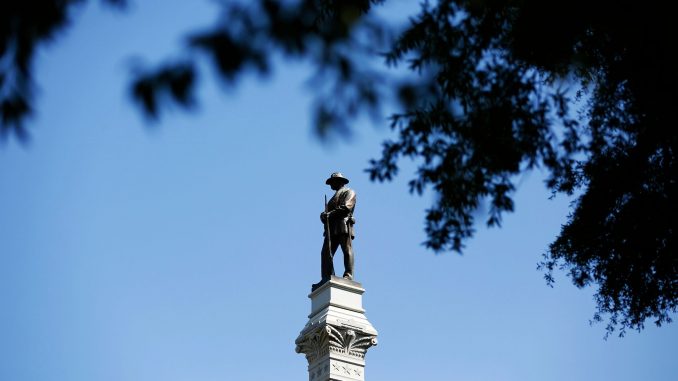
RALEIGH — The North Carolina Historical Commission met Friday to consider a request made by Gov. Roy Cooper that the body vote to remove and relocate Confederate statues currently placed on the grounds of the Old State Capitol building in Raleigh. The commission voted 9–1 to postpone any action on the Governor’s request until April 2018 to seek legal guidance and form a committee to study the issue.
Specifically, the Governor’s request is to move the three Confederate statues from outside the State Capitol to the Bentonville Battlefield historical site in Johnston County. Machelle Sanders, secretary of the Department of Administration and a Cooper appointee, sent the petition to the state Historical Commission. Cooper had previously stated that “we cannot continue to glorify a war against the United States of America fought in the defense of slavery. These monuments should come down.”
A 2015 law titled the Historical Artifacts Management and Patriotism Act, gives the state Historical Commission authority over moving Confederate statues. The law states that any relocation of a monument must be to “a site of similar prominence, honor, visibility, availability and access that are within the boundaries of the jurisdiction from which it was relocated.”
The North Carolina Senate voted unanimously for the legislation, including a “Yes” vote from then-state senator and current N.C. Attorney General Josh Stein. Stein, a Democrat, now reportedly says he regrets his vote and would vote against the measure if he had another chance.
Students at the University of North Carolina at Chapel Hill protested in recent weeks for the removal of the “Silent Sam” Confederate statue from campus. Cooper gave the university system “permission” to remove the statue in the interest of public safety, citing possible harm to protesters as they tore down the monument, but his offer was rebuffed by university officials who said his authority to give such permission could not be sufficiently supported by the law.
Gov. Cooper’s latest foray into monument removal was met with staunch opposition from both chambers of the state legislature prior to Friday’s commission meeting. Republican leaders in the state House of Representatives sent a legal memorandum to the Historical Commission “to ensure the Historical Commission has a clear understanding of the statute and the limitations on determinations and actions available to the Commission.”
In the memo, House leaders, including the Speaker of the House, Tim Moore (R-Cleveland) argued that relocation of historic monuments is allowed to preserve the object or when necessary for construction, renovation, or reconfiguration of buildings or other public spaces. The memo cited the relocation of the historic Cape Hatteras Lighthouse as “necessary to preserve this National Landmark from the encroachment of the ocean at the original site.” The House leaders also argued that the 2015 law “in no way applies to the relocation of an object of remembrance to reduce its potential for exposure to protest or criminal activity.”
Senate leader Phil Berger (R-Rockingham) reiterated the legal arguments from the House GOP memo in a letter to Governor Cooper. Berger also called Gov. Cooper’s request an example of “selective outrage” questioning the Governor’s decision to ask for removal of “monuments to regular North Carolinians who died during the Civil War (most of whom did not own slaves), a monument of a grandmother and child erected to honor the hardships and sacrifices of North Carolina women during the Civil War, and a monument to an unlucky 19-year-old carpenter’s apprentice from Tarboro who was the first North Carolinian killed in the Civil War.”
Berger’s letter went on to question why Cooper did not ask for removal of prominent leaders in the Democratic party, including Democrat Governor Charles Aycock who Berger characterized as “an avowed white supremacist,” Democrat Governor Zebulon Vance, a Confederate colonel, and Democrat President Andrew Jackson who Berger noted was responsible for the deadly “Trail of Tears” involving North Carolina Native Americans. Berger admonished the Governor that “it’s just this kind of divisiveness that could drive away potential employers, and further erode the public’s trust in our respective institutions at a time when we should be cooperating to solve these significant challenges.”
While the Historical Commission did not weigh in on the politics — or the merits of the Governor’s request — the issue of historical monuments will continue.



